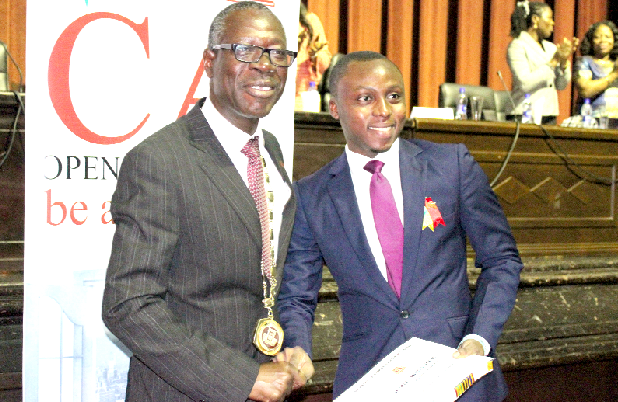The Institute of Chartered Accountants, Ghana (ICAG) has taken steps to become the sole regulator of the accountancy profession in the country.
The President of ICAG, Mr Christian Sottie, says such a move has become necessary because of a World Bank report in 2004 which “highlighted that accounting and audit practices in the country suffer from institutional weakness in regulation.”
At the institute’s 27th graduation and admission ceremony in Accra last Saturday, he said the initiative by ICAG would “strengthen the regulation of audit in the Ghanaian Business environment.”
This year’s ceremony saw the graduation of 259 students who have completed the chartered accountancy professional programme and the formal admission of 282 qualified chartered accountants as members of ICAG.
Four of the graduates were Liberians who wrote the examinations conducted by ICAG in Monrovia, Liberia.
Progress
As part of the initiative to regulate the accountancy profession, Mr Sottie explained that the Quality Assurance Monitoring Department of ICAG had registered over 200 accounting and auditing firms.
“We have also conducted assurance and monitoring processes on these firms. This is to address the gaps with regard to auditing standards to enhance good financial reporting by the auditing firms. We are steadily making progress,” he said.
Professional ethics
With regard to the ethics of the profession, Mr Sottie said accountants ought to be transparent in all aspects of their work to promote the image of the accountancy profession and also the development of the country.
Such traits, he said, would also prevent accountants from engaging in unlawful acts which would ruin their careers.
Mr Sottie explained that integrity ought to be the hallmark of any accountant owing to the fact that public confidence in the profession was key to its development.
Needed skills
In a speech read on her behalf, the Minister of Education, Professor Naana Jane Opoku-Agyemang, stressed the need for accountants to acquire new skills to enable them to solve the challenges of modern financial sector.
“Business and other organisations are engaging in ever more complex arrangements and transactions. Apart from your technical accounting knowledge and skills, you need skills that will enable you to be, when appropriate, business advisors, financial analysts, communicators, negotiations and managers,” she said.
For her part, Professor Goski Alabi from the University of Professional Studies, Accra (UPSA) advised the graduates to be humble in all their endeavours.
“Remember that there are many things that your qualification cannot do for you, but humility and good relationships can do them for you,” he said.

